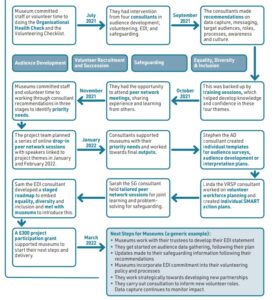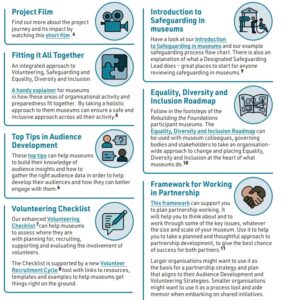 Rebuilding the Foundations: Gloucestershire’s Museums
Rebuilding the Foundations: Gloucestershire’s Museums
Rebuilding the Foundations: Gloucestershire’s Museums was developed and delivered by South West Museum Development with funding from the National Lottery Heritage Fund and support from Arts Council England. It took place from April 2021 to March 2022.
This resource is designed for museums and Museum Development practitioners to share the learning and practice developed through the implementation of this project. It sets out the need for this project and the project journey followed by participant museums. Drawing on the external evaluation, this resource summarises the key outcomes for participant museums, along with the next steps for museums and for South West Museum Development.
It also introduces the practical resources developed through the course of the project journey. These resources can support the museum sector to refresh their approaches and ways of working across the four areas of focus addressed by the project.
Introduction
Rebuilding the Foundations: Gloucestershire’s Museums was developed and delivered by South West Museum Development with funding from the National Lottery Heritage Fund and Arts Council England. It took place from April 2021 to March 2022.
This resource is designed for museums and Museum Development practitioners to share the learning and practice developed through the implementation of this project. It sets out the need for this project and the project journey followed by participant museums. Drawing on the external evaluation, this resource summarises the key outcomes for participant museums, along with the next steps for museums and for South West Museum Development.
It also introduces the practical resources developed through the course of the project journey. These resources can support the museum sector to refresh their approaches and ways of working across the four areas of focus addressed by the project. These resources can be found online on South West Museum Development’s website.
The museums in Gloucestershire that participated
Court Barn Museum, Chipping Campden,
Cotswold District: small staff team, volunteers
integral to operation
Dean Heritage Centre, Coleford, Forest of Dean
District: small staff team, volunteers integral to
operation
Dr Jenner’s House Museum and Garden,
Berkeley, Stroud District: small staff team,
volunteers integral to operation
Holst Victorian House, Cheltenham Borough:
small staff team, volunteers integral to operation
Jet Age Museum, Tewkesbury Borough: volunteer
led and operated
Museum of Gloucester, Gloucester, Gloucester
City: staff team, volunteers support visitor
experience
Museum in the Park, Stroud, Stroud District: staff
team, volunteers support visitor experience
Tetbury Police Museum and Courtroom, Tetbury,
Cotswold District: micro museum, volunteers
integral to operation for Town Council
Tewkesbury Museum, Tewkesbury, Tewkesbury
Borough: micro museum, volunteer led and
operated
Winchcombe Museum, Winchcombe, Tewkesbury
Borough: micro museum, volunteer led and
operated
In total, 500 hours of volunteer time were committed across these museums to taking part in this project.
Rebuilding the Foundations – project need
The participant museums face fundamental challenges to their resilience which have been exacerbated and accelerated by Covid-19. Lack of audience diversity; over-reliance on an older volunteer workforce; dependence on the tourism market; and for some a lack of robust, well-developed systems to enable genuine widening of their audience and volunteering offers have resulted in an increased distance between museums and their communities.
Volunteering data collected by South West Museum Development through the Annual Museum Survey 2 identified that volunteer numbers at museums in Gloucestershire during 2019/20 had decreased by 11% compared to the previous year, with a 31% decrease at five of the ten participant museums. This represents a 20% reduction of the value of contributed volunteer hours to the local economy.
The Covid-19 pandemic led to protracted, unpredicted periods of forced closure and diverted scarce resources into planning for Covid-safe working and into securing emergency funding to address income shortfalls. Volunteers across all age brackets, but particularly older age groups, shielded for health reasons; long periods of closure accelerated the decline in volunteer numbers. Three of the participant museums were unable to reopen in 2020 for this reason. This experience was reflected in museums across the country: over the period 2020/21, volunteer numbers in museums across England fell by one fifth.
Alongside this reduction in volunteer capacity, and prior to Covid-19, these museums were also seeing a reduction in audience participation. Four of the ten participant museums were experiencing a 62% decrease in the number of audiences participating in educational events/activities and non-educational events/activities, on and off-site, between 2018/19 and 2019/20. Volunteer capacity was a contributory factor here as well.
As a result of these challenges, the cultural potential that these museums hold for their communities was significantly under-utilised at a time when museums were most needed to support the health and wellbeing of their communities. This pointed to an urgent need for a fundamental review of their position and direction – in relation to audiences, volunteer support and relationships with the local community.
Rebuilding the Foundations provided participant museums with targeted investment to enable them to review, refresh and reposition themselves to become more sustainable, resilient and outward-looking organisations.
Key stages in the project journey
The project set museums on a development journey to empower them to build capacity, skills and confidence. To support the range of specialist development support involved in the project, a project team was established which included a freelance Project and Partnerships Co-ordinator, South West Museum Development specialist officers in Audience Development and Sustainable Volunteering alongside the South West Museum Development local Museum Development Officer for Gloucestershire. The project also engaged four specialist consultants who focused on each of the key project themes as well as an external evaluator.
Rebuilding the Foundations: the project journey

Organisational Health Check
Rebuilding the Foundations began by engaging participant museums in Museum Development England’s Organisational Health Check. A self-assessment tool addressing six key areas of a museum’s operations, the process is closely supported by the Museum Development Officer on the ground. Museums also completed South West Museum Development’s Volunteering Checklist to assess their systems for involving volunteers.
The information gathered was used as the starting point for developing the priority needs and programme of support for each museum with the four specialist consultants. Participant museums found that the process offered them a chance to step back from everyday issues, to reflect and pinpoint areas for development.
“There were differences of opinion but it was useful to have the discussions. It highlighted differences in perception.’
‘SWMD […] gave a very good initial picture of the state of play, which was helpful […] in terms of a starting point.’
Specialist consultants
The four specialist consultants visited or met online each of the ten participant museums. They provided bespoke on-site and remote support and developed a series of draft recommendations for museums to consider and identify priorities. Consultants then worked on final outputs and supported museums to take next steps with their priorities.
“It was very good to have an independent person’s perspective – this gave us the odd lightbulb moment and got the juices flowing as to where to go next.”
Skills training
The consultants each delivered an online training session in their area of expertise – Audience Development; Volunteering; Safeguarding; and Equality, Diversity and Inclusion. The training sessions were run as part of South West Museum Development’s SW Museum Skills Programme and each session was opened up to all Gloucestershire museums, not just project participants, as well as the wider South West region. 66 delegates engaged in online training. These sessions helped delegates to build knowledge and skills and prepare to take action at their museums across the four project themes.
The Peer Network
The Peer Network provided museums with the opportunity to discuss their priorities and plans as these related to the project; to practise new ways of working together including: active listening; action learning; prioritisation; planning for effective internal communication; planning promotion of volunteering and exploring and prioritising partnerships. This work involved contributing to practical group exercises to develop their own confidence and to support others to do so as well.
“The overall experience of talking to people, museums, professionals and to others to exchange views on problems and issues, it’s a mutual learning, seeing how others do it”
Expert speakers at peer networking sessions, both in person and online, covered:
- effective volunteer management
- engaging audiences with collections
- evaluation planning and prioritisation
- volunteer skills audits
- audience development plans
- agile project management
Key project themes
Audience Development
Through tailored consultant intervention and skills training, museums developed their understanding of devising, gathering and analysing audience research to support them to target their offers and to prioritise their efforts in reaching new audiences. Each museum had a different starting point so the recommendations made took these into account.
Museums are now equipped to:
- Understand how to put together and manage an audience survey
- Have a clearer idea of what data to collect and how it can support their audience development
- Take a more focussed approach to targeting audiences with more tailored and relevant offers
- Refresh their understanding of messaging and interpretation and the importance of linking this back to audience needs as well as organisational mission, vision and aims
- Be more open to the value of continuous review and reflection in audience development.
“The audience development support chimed with us and where we are at […] It gave us the idea of a light touch audit which we can do straight away. It helped us by giving us a roadmap that will help [us] through a difficult stage [by making] recommendations on the stories we can present and who to, in order to take our collections [beyond the museum itself], – it will all [help to] increase engagement.”
Volunteer recruitment and succession planning
Support was tailored according to the governance structure and needs of each participating museum. Volunteer-run museums taking part in this project were supported to review their workforce structure and analyse gaps in the skills and numbers of people required to operate the museum. The process helped museums to strengthen their structures and target and prioritise volunteer recruitment needs. Each museum received targeted advice on the development of volunteering processes and policies.
The consultant also directly addressed museums’ internal communication, supporting them to review, streamline and improve effectiveness.
A key part of the support helped museums to develop their ideas for new roles, including new role descriptions and opportunities with potential to engage a wider range of people as volunteers.
Museums were supported to review their ongoing relationship with current volunteers, including two way feedback, 1-1 reviews and consultation.
“The volunteering advice was brilliant. Lots to take on board and put into a moving forward plan. What will make the biggest difference? Volunteer roles and volunteer policy review, especially when we come to making grant applications around volunteers and inclusivity. Having done this now really helps the museum.”
Safeguarding
Museums received detailed, tailored support to develop and implement safeguarding policies and procedures for their individual settings. Through peer support sessions they explored the practicalities of implementing processes and supporting their teams, putting the right safeguarding procedures in place to be able to become genuinely welcoming organisations that involve a wider range of people.
Equality, Diversity and Inclusion
Through conversations with the appointed consultant, it quickly became clear that not all
participant museums were ready to adopt and follow an organisation-wide approach to Equality, Diversity and Inclusion. They required further time to understand the inter-connected nature of Equality, Diversity and Inclusion and the need for support, understanding and buy-in at all levels of the organisation – which reflects its relevance to everything they do as museums. To support the museums with this specific need, the consultant worked with decision makers at the museums and developed and tested a roadmap, breaking this work down into clear stages. Court Barn Museum reflects on film on the impact of Rebuilding the Foundations’ Safeguarding and Equality, Diversity and Inclusion support.
Resources
Rebuilding the Foundations project work has resulted in the development of a range of tried and tested resources available for application by other museums, heritage organisations and sector development officers.

Project outcomes and next steps
For museums
Museums have tools in key project areas to support their future resilience and sustainability.
This project enabled participant museums to analyse where their offer to volunteers and audiences could change and then to plan the steps needed to make these changes. It put technical knowledge and skills in place to provide and maintain flexible and varied volunteer opportunities to new groups; to reach out to under-represented groups as audiences, supporters and volunteers; and to welcome them appropriately and safely, supported by robust and effective policies and procedures. Museums received plans with developed targets across the key areas covered by the project including Audience Development; Volunteer Recruitment and Succession Planning; Safeguarding; and Equality, Diversity and Inclusion.
This approach has helped to rebuild resilience for these ten Gloucestershire museums. They are now better able to withstand threats and develop mechanisms to adapt to changing circumstances, aptitudes that are more necessary than ever as the effects of the Covid-19 pandemic continue to play out.
There is evidence of changes in mind-set; new ways of thinking that will enable new ways of working, including preparing to involve a wider range of people as visitors and volunteers.
The project engendered a culture across participant museums of tackling priority needs, individually and together, unlocking the potential of a more responsive, connected and confident museum sector in Gloucestershire.
Linking museums and heritage into local volunteering strategies and infrastructure. Rebuilding the Foundations funded research into locally available tools to support museums with volunteer recruitment. The research explored the available options and recommended that Gloucestershire’s museums and heritage organisations connect into Govolunteerglos, an evidence-based, local, integrated and sustainable website for growing varied and high quality volunteering opportunities. This website is being developed by Gloucestershire Voluntary and Community Sector (VCS) Alliance with funding from Gloucestershire Clinical Commissioning Group and Gloucestershire County Council, for launch in late spring 2022. The website will be designed to appeal to individuals with a wide range of motivations, interests and available time to volunteer. It is supported by a three-year funded post to enable organisations and prospective volunteers to engage. The Gloucestershire heritage sector is already holding conversations to ensure that it can both influence and be an early adopter of the platform.
For South West Museum Development
South West Museum Development will take the overall recommendations from the external project evaluation forward.
We will:
- Carry out longer term evaluation of the project impact with museums at 6 months and 12 months post project
- Invest in the provision of feedback and challenge through the Museum Development Officer for Gloucestershire, to help museums to act on the specialist advice from this project and sustain their development journeys
- Continue to develop the way we apply the Organisational Health Check and Volunteering Checklist, and gather case studies where these tools have supported successful, targeted museum development intervention and genuine organisational progress for museums
- Continue to develop our team’s skills in facilitating museum development via peer network learning, further improving our delivery in this area. We will develop and share our expertise in the use of targeted, practical exercises to better support museums to work towards shared outcomes
- Apply our learning around training and development to the SW Museum Skills programme and to our work with museums in cohorts to maximize impact and benefit
- Promote and make available the bank of resources which have supported the Rebuilding the Foundations museums’ development journeys, particularly those resources that support museums to take an integrated approach to Audience Development, Volunteering, Safeguarding, and Equality, Diversity and Inclusion
- Through an integration of evidence from theAnnual Museum Survey and our South West
Visitor Insights programme12 along with our support to museums within Arts Council England’s Accreditation standard and Let’s Create Diversity and Inclusion investment principle13, we will continue to help museums to develop consistent, appropriate and sustainable ways of monitoring diversity and the protected characteristics of visitors and volunteers, and to consult non-users, supporting them to widen participation.
